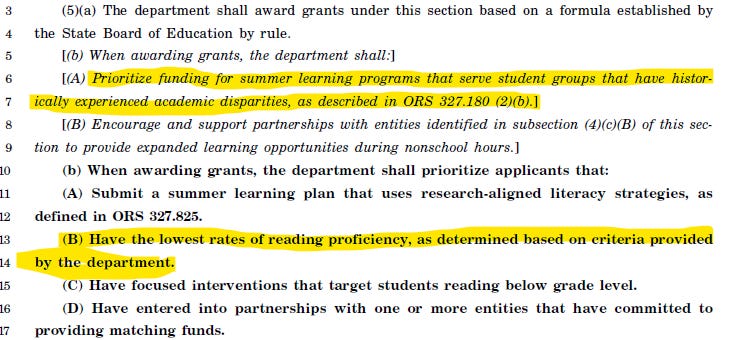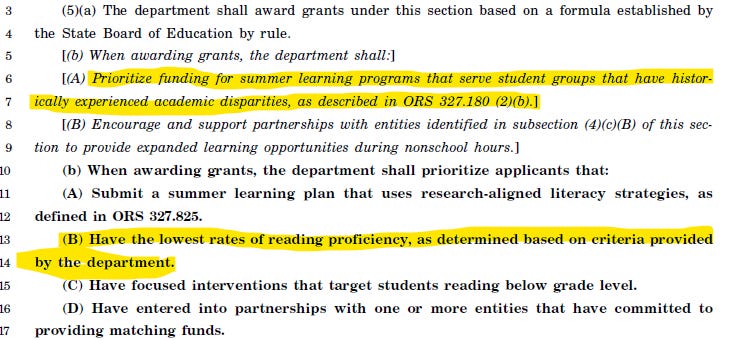Breaking: Dems fast-track bill removing race from summer school grant criteria
Oregon Roundup exclusively reported on race-based criteria Saturday; bill to remove criteria introduced by Speaker day after Roundup sought comment from Education Dept; hearing set for tomorrow

The Oregon House of Representatives is fast-tracking a bill to remove student racial criteria from the state’s Summer Grant Program days after Oregon Roundup exclusively reported the Oregon Department of Education’s use of those constitutionally dubious criteria to prioritize $30 million in grant funding last year.
The bill removing racial criteria, HB 2007, was introduced by House Speaker Julie Fahey, Representative Ricki Ruiz and Senator Janeen Sollman, Democrats all, on March 13, the day after Oregon Roundup first reached out via email to four ODE staff members for comment on the program’s racial criteria.

On Saturday, March 14, ODE spokesperson Marc Siegel emailed Oregon Roundup, “ODE issues grants in according with how the legislature required it to.”
HB 2007 is already scheduled for a hearing in the House Education Committee tomorrow, a lightning-fast procedural pace midway through a legislative session already chock-full with controversial measures vying for attention.
Oregon’s Summer School Grant program is less than a year old. HB 4082, which created the Summer School Grant program was just passed and signed into law last year. It passed both houses of the legislature easily on a bipartisan basis (53-4 in the House; 26-4 in the Senate). It ordered ODE was to prioritize which districts would receive grant funding from the limited pool to help students who are economically disadvantaged, “from racial or ethnic groups that have historically experienced academic disparities,” with disabilities, “English language learners” and homeless and foster children.
ODE administrative rules provide the list of preferred racial and ethnic identities
includes, but is not limited to American Indian and Alaska Native students, Black and African American students, Hispanic and Latino students, Native Hawaiian and Pacific Islander students, and multiracial students, and any other racial or ethnic group identified by the school district as historically experienced academic disparities.
In a document called “State Summer Learning Grant Program Parameters,” ODE explains it determined 2024 grant prioritization solely on the number of students in a district deemed to be part of one of the preferred “Focal Student Groups” described in the administrative rule as a percentage of the total district student population.
Then, according to ODE, “The Summer Learning Grant funds were allocated to school districts and charter schools with the highest priority ranking until the $30 million had been fully allocated.” The amount of the grant to each district or charter school was determined by the total student population in the district.
The districts with the highest priority ranks that received funding included districts and charter schools with relatively high percentages of racial minority students. Districts, including large but mostly white districts and small, rural mostly white districts, were ineligible for summer school funding because of their low number of racial minority students.
In 2024, a district’s historic student test scores, graduation rates, attendance and other indicators of academic success were irrelevant to ODE’s prioritization. The prioritization was based exclusively on the percentage of students who fit into a preferred racial or ethnic group, were disabled, homeless, etc.
HB 2007 would entirely remove the explicitly race-based criteria upon which ODE awarded funding in 2024. It would eliminate the requirement that grant prioritization go to “summer learning programs that serve student groups that have historically experienced academic disparities as described in ORS 327.180(2)(b).” That statute describes such groups to include “students from racial or ethnic groups that have historically experienced academic disparities, as determined under rules adopted by the State Board of Education.”
In the place of race-based criteria, HB 2007 would prioritize granting funding for districts and charter schools that have the lowest rates of reading proficiency.

Article I, section 20, of the Oregon Constitution, states, “No law shall be passed granting to any citizen or class of citizens privileges, or immunities, which, upon the same terms, shall not equally belong to all citizens.”
Oregon courts appear entirely disinterested in enforcing the state’s constitution as written. However, the same cannot be said for the 14th Amendment to the U.S. Constitution’s prohibition against states “denying any person within its jurisdiction the equal protection of the laws.”
Chief Justice John Roberts, in the U.S. Supreme Court’s 2023 decision in Students for Fair Admissions, Inc. v. President and Fellows of Harvard University, wrote that a college runs afoul of the 14th Amendment’s Equal Protection Clause when its admission policies confer benefits to some applicants based on the race of those applicants. It is widely expected the holding in Students for Fair Admissions will be applied by federal courts to other contexts in which states confer benefits in part on the basis of a person’s race or ethnicity.
As reported exclusively by Oregon Roundup, the State of Oregon in 2021 adopted its “Diversity, Equity, and Inclusion Action Plan: A Roadmap to Racial Equity and Belonging.” The Action Plan calls on all state employees to seek racially equitable outcomes, defined as “the redistribution of resources, power, and opportunity to . . . communities . . . impacted by systemic oppression.”
The Trump Administration is attempting to dismantle educational programs based on race and ethnicity. It announced last week that the University of Oregon is one of 60 universities nationwide under investigation for race-exclusionary practices in its graduate school programs.
Earlier this morning, Oregon Roundup contacted via email the sponsors for the bill inquiring why they introduced it. The story will be updated with any responses.





Jeff, you're too modest to explicitly claim your inquiry caused this near instantaneous legislative response. And we can never prove that cause and effect. But I can reasonably assume it's all on you, Mr Roundup. Gratitude. Appreciation. March on!
Outstanding work sir. Keep the light shining.